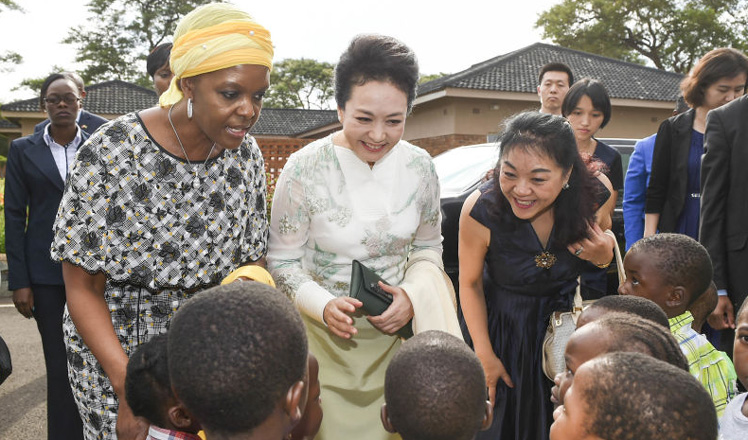Learning from China’s lonely elders in the countryside
Updated: 2015-12-05 03:53
By Yan Dongjie(China Daily USA)
|
||||||||
Most of the older people in the rural Chinese village who the young Oxford University researcher hoped to talk to shared a look of nervousness and curiosity.
After all, the doctoral candidate from the United Kingdom was only in her 20s, she didn’t exactly fit in.
But with a dollop of compassion and a listening ear, their mood began to change.
As Verity Robins sat on the elders’ kang, a brick bed common in northern China and heated in winter, and asked about their family members, their health and their recent harvest, all in fluent Chinese, they felt more at ease and talked more.
Robins, who has traveled across China and visited nearly 50 villages in the past 10 years, is doing research on the elderly in Chinese villages.
Older people living in difficult conditions account for about half of the nation’s total aging population of 212 million, according to the Social Blue Book jointly released by the Chinese Academy of Social Sciences and the Social Sciences Academic Press.
Nearly half of the aging population in the countryside are “empty nest” elderly, who are alone in the villages while their children are working in cities.
Some older people she talked to in the village in Northwest China’s Shaanxi province wept, but “whether it’s for a stranger’s solicitude or their own unspeakable loneliness, I cannot tell”, said Robins. One older man she interviewed told her: “It’s not easy for foreigners to come across oceans to see us old and useless people.”
The 27-year-old Briton is interested in Chinese cultures and speaks good Mandarin, as well as some regional dialects.
“I feel the Shaanxi dialect is easy to understand. Words just take a different tone,” she said, after finishing a day of interviews.
Those interviews were usually comprised of 10 to 14 30-minute individual interviews with older farmers and a group interview with the committee members of the village’s Older People’s Association, established for the benefit of senior villagers by local governments and supported by Help Age International, an NGO working in over 70 countries.
Robins worked for Help Age as a researcher and consultant over the summer, but it is only one of the NGOs she has worked with to get in-depth knowledge about older Chinese people and find out innovative ways to help them.
“She has a researcher’s commitment to extended fieldwork in rural areas of China, and that’s what strikes me the most,” said Luo Zhengpeng, a Chinese friend of Robins’ who is a doctoral candidate at the University of Hong Kong.
Her interaction with older people in China started many years ago.
In 2009, Robins, then 21, came to China and volunteered at an NGO based in Kunming, capital of South China’s Yunnan province. She went with a group of college students to a remote community made up of older people with leprosy.
There were around 30 people in the village, and a couple of chidren, perhaps grandchildren. Parents who are away working in cities often must rely on grandparents to raise their children. Without them the elderly would truly be isolated and alone.
“They (the lepers) were pushed out of the villages. ... Their families didn’t want them,” said Robins.
To reach the village, Robins and other NGO workers walked for two hours and traveled for another hour in a cart until they were deep in the mountains, where they stayed for a month, sleeping on the floor of a derelict house.
“It was a good experience, but I was always scared because there was one night when we woke up and there were ants all over the floor. I felt they were crawling on end,” Robins said.
This was the first time she had spent such a long time in a Chinese village, having close interaction with lonely, traumatized older people, carrying water for them from afar and trying to heal their deep psychological wounds.
After that, Robins made the Chinese countryside her main field of study. She went on to become a doctoral candidate at Oxford after using her China experience in partial fulfillment of her master’s degree.
She currently is doing cross-departmental studies in politics and international relations.
“The great thing about befriending Chinese people in their 70s and 80s is that their lives are like a personal account of Chinese history; they’ve been through every step of China’s recent past,” Robins said.
She said that for her, China is no longer just a place that she frequently travels to, but a home away from home where she always finds time to return.
- Locals have tradition of drying foods during harvest season
- Beijing-Tianjin-Hebei govts to cooperate on emissions control
- Web promotion of prostitution to be targeted
- Two more spells of smog predicted to sweep North China
- Glass bridge in grand canyon of Zhangjiajie under construction
- Road rage cases pose huge safety challenge

 Can Chinese ‘white lightning’ make it in US?
Can Chinese ‘white lightning’ make it in US?
 Gunmen go on a killing spree in Southern California
Gunmen go on a killing spree in Southern California
 Chinese, South African presidents hold talks to cement partnership
Chinese, South African presidents hold talks to cement partnership
 China, Zimbabwe agree to boost cooperation
China, Zimbabwe agree to boost cooperation
 First lady visits Africa's 'new window' on China
First lady visits Africa's 'new window' on China
 BRICS media leaders to secure louder global voice
BRICS media leaders to secure louder global voice
 Western science in the eyes of Chinese emperors
Western science in the eyes of Chinese emperors
 Top 10 smartphone vendors with highest shipments in Q3 2015
Top 10 smartphone vendors with highest shipments in Q3 2015
Most Viewed
Editor's Picks

|

|

|

|

|

|
Today's Top News
Shooting rampage at US social services agency leaves 14 dead
Chinese bargain hunters are changing the retail game
Chinese president arrives in Turkey for G20 summit
Islamic State claims responsibility for Paris attacks
Obama, Netanyahu at White House seek to mend US-Israel ties
China, not Canada, is top US trade partner
Tu first Chinese to win Nobel Prize in Medicine
Huntsman says Sino-US relationship needs common goals
US Weekly

|

|








